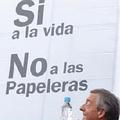拉美國家首度為環境問題告上國際法庭
 烏拉圭河為阿根廷與烏拉圭共享之天然資源,而目前正在烏拉圭河東岸進行中的兩個紙漿廠開發計劃,造成兩國政府情勢的緊張,並引發雙方強烈的爭執。阿根廷已於4日將反對烏拉圭的紙漿計劃上呈海牙國際法庭,阿國總統基西納(Nestor Kirchne)並於5日發動一場抗議紙漿計畫的集會。
烏拉圭河為阿根廷與烏拉圭共享之天然資源,而目前正在烏拉圭河東岸進行中的兩個紙漿廠開發計劃,造成兩國政府情勢的緊張,並引發雙方強烈的爭執。阿根廷已於4日將反對烏拉圭的紙漿計劃上呈海牙國際法庭,阿國總統基西納(Nestor Kirchne)並於5日發動一場抗議紙漿計畫的集會。
這宗法律案件,不僅是拉丁美洲國家首次為環境問題控告鄰國的案例,也是世界銀行資助的開發計畫首次進入國際法庭審理程序。
爭議中的兩座紙漿廠計畫,係由芬蘭Metsa Botnia公司與西班牙Ence公司開發,地點位於烏拉圭夫拉本托市(Fray Bentos),鄰近烏、阿兩國交界之處。
兩項計畫中的紙漿廠,將採用無氯技術製造出口用的桉樹紙漿;阿根廷政府指出,兩座工廠預期能生產150萬噸的紙纖維,是全世界最大型的出口計畫,但是「也對環境上造成非常大的衝擊。」阿根廷控訴烏拉圭當局無視兩國在1975年簽署的《烏拉圭河協議》,未經過諮商與「事前告知並取得同意」的程序,即逕行核准設立兩座紙漿廠與一座專用碼頭。
烏拉圭政府則是及於推動紙漿廠計畫。烏拉圭總統瓦奎茲3日與世界銀行總裁伍夫維茲會面,即是為了確認世界銀行是否將核准開發項目的貸款──目前兩個開發計畫均尚未收到世銀的資助款項,但國際金融公司(International Finance Corporation,IFC)與多邊投資保證機構(Multilateral Investment Guarantee Agency,MIGA)正考慮提供4億美元的金援。
在2005年6月3日,烏阿兩國數十個環保團體與個人聯名對IFC發表一封公開信,信中抨擊,不論是芬蘭Metsa Botnia公司與西班牙Ence公司,都尚未就該案的潛在社會衝擊進行嚴謹的評估,也未考量紙漿廠廢水排放問題,以及令人掩鼻的強烈臭氣,甚至對當地居民健康的潛在衝擊,而這些都將帶來可預見的工作機會喪失問題。
A heated dispute between Argentina and Uruguay over two pulp mill projects, currently under construction on the eastern shore of the Uruguay River, a natural resource shared by both countries, has both governments steaming. Argentina filed a case against Uruguay over the mills in the International Court of Justice in the Hague on May 4. The next day, Argentine President Nestor Kirchner led a rally against the mills.
The filing is the first time that a Latin American country has taken a neighboring state to international court over an environmental dispute. It is also the first time that a World Bank project will be the focus of a case at the International Court of Justice.
The mills are being built by Finnish company Metsa Botnia and Spanish company Ence in the vicinity of Fray Bentos, Uruguay near the border between the two countries.
Plans call for the mills to use elemental chlorine free technology to manufacture bleached eucalyptus pulp for export. These factories are expected to produce 1.5 million tons of cellulose, one of the largest outputs in the world and "a very significant environmental challenge," the Argentine government said.
Argentina complains that Uruguay authorized the construction of the pulp mills and of a port for the exclusive use of one of them without following the mechanism of consultation and prior information agreed by both countries in the treaty of 1975 on the Statute of the Uruguay River.
The government of Uruguay is eager to see the pulp mills go ahead. Tabaré Vasquez, Uruguay's president met May 3 with World Bank President Paul Wolfovitz in an effort to get explicit Bank approval for the projects. The mills, which have not yet received World Bank funding, are under consideration by the International Finance Corporation and the Multilateral Investment Guarantee Agency to receive over US$400 million.
In an open letter from dozens of environmental groups from both countries as well as concerned individuals to the International Finance Corporation (IFC) on June 3, 2005, the critics say that neither Metsa Botnia nor Ence have carried out any serious studies on the possible negative social impacts of their projects, either in the matter of foreseeable loss of jobs related to the liquid effluents, and to gaseous emissions with a strong and disagreeable smell, of the pulp mills, or of the possible impacts on the health of the local population.



